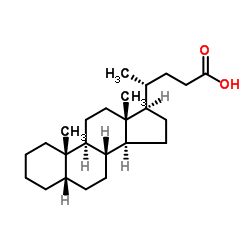5β-cholanoic acid

5β-cholanoic acid structure
|
Common Name | 5β-cholanoic acid | ||
|---|---|---|---|---|
| CAS Number | 546-18-9 | Molecular Weight | 360.573 | |
| Density | 1.0±0.1 g/cm3 | Boiling Point | 473.6±13.0 °C at 760 mmHg | |
| Molecular Formula | C24H40O2 | Melting Point | N/A | |
| MSDS | Chinese USA | Flash Point | 208.7±11.2 °C | |
|
An efficient synthesis of 4 beta- and 6 alpha-hydroxylated bile acids.
Steroids 58(2) , 52-8, (1993) An efficient method for the preparation of 4 beta- and 6 alpha-hydroxylated bile acids has been developed. It involved a highly stereoselective acetoxylation at the 4 beta and 6 alpha positions of 3- and 7-oxo bile acids, respectively, with lead tetraacetate ... |
|
|
Calcium- and voltage-gated potassium (BK) channel activators in the 5β-cholanic acid-3α-ol analogue series with modifications in the lateral chain.
ChemMedChem 7(10) , 1784-92, (2012) Large conductance, calcium- and voltage-gated potassium (BK) channels regulate various physiological processes and represent an attractive target for drug discovery. Numerous BK channel activators are available. However, these agents usually interact with the... |
|
|
Cholanic acids determined in commercial drugs by means of a new ISFET device.
J. Pharm. Biomed. Anal. 11(11-12) , 1207-14, (1993) An ISFET device selective for cholanic acids, based on a PVC-sebacate membrane, containing benzyldimethylcetylammoniumcholate as exchanger, has been prepared, characterized and applied to the determination of cheno or ursodeoxycholic acid content of commercia... |
|
|
Synthesis of [3,4-(13)c(2)]-enriched bile salts as NMR probes of protein-ligand interactions.
J. Org. Chem. 67(19) , 6764-71, (2002) Synthetic methodology that allows for incorporation of isotopic carbon at the C-3 and C-4 positions of bile salts is reported. Three [3,4-(13)C(2)]-enriched bile salts were synthesized from either deoxycholic or lithocholic acid. The steroid 3alpha-OH group w... |
|
|
Microwave-induced organic reactions of bile acids: esterification, deformylation and deacetylation using mild reagents.
Steroids 60(6) , 453-7, (1995) An efficient and convenient procedure for the esterification, deformylation, and deacetylation of bile acids is described. This is achieved by the addition of a catalytic amount of methanesulfonic acid or para-toluene sulfonic acid to a solution of bile acid ... |
|
|
Synthesis of 7- and 12-hydroxy- and 7,12-dihydroxy-3-keto-5 beta-cholan-24-oic acids by reduction of 3,7-, 3,12- and 3,7,12-oxo derivatives.
Steroids 58(11) , 524-6, (1993) 7 alpha-, 12 alpha-, 12 beta-Hydroxy and 7 alpha,12 alpha- and 7 alpha,12 beta-dihydroxy-3-ketocholanoic acids were prepared in satisfactory yields protecting the 3-keto group as dimethyl ketal and subsequent reduction with sodium borohydride of the correspon... |
|
|
5beta-Cholane activators of the farnesol X receptor.
J. Steroid Biochem. Mol. Biol. 94(4) , 311-8, (2005) The farnesoid X receptor (FXR) is activated by bile acids, natural agonists for this nuclear receptor. FXR-target genes play important roles in cholesterol and lipid metabolism. We have found that a series of 5beta-cholanic acid derivatives, even though witho... |
|
|
Synthesis of 7 alpha,12 alpha-dihydroxy-3 alpha- [2-(beta-D-glucopyranosyl)acetyl]-5 beta-cholan-24-oic acid.
Steroids 55(7) , 303-7, (1990) A C-glucoside of cholic acid was synthesized by the introduction of an acetyl group at position 3 alpha and direct one-pot C-glucosidation using 2,3,4,6-tetra-O-benzyl-alpha-D-glucopyranosyl chloride. |
|
|
New polyfluorothiopropanoyloxy derivatives of 5β-cholan-24-oic acid designed as drug absorption modifiers.
Steroids 78(9) , 832-44, (2013) A series of final six propanoyloxy derivatives of 5β-cholan-24-oic acid (tridecafluoroctylsulfanyl- and tridecafluoroctylsulfinylethoxycarbonylpropanoyloxy derivatives) as potential drug absorption promoters (skin penetration enhancers, intestinal absorption ... |
|
|
Dye-hydrophobic hapten conjugate/anti-dye antibody complex as immunogen: preparation of hydrophobic hapten-specific monoclonal antibodies.
Biochimie 76(2) , 171-9, (1994) In order to induce the production of antibodies specific for small molecules, it is common to link them to a protein. However, when the small molecule is very hydrophobic it is extremely difficult to prepare such a conjugate. Here, we describe a simple way to... |